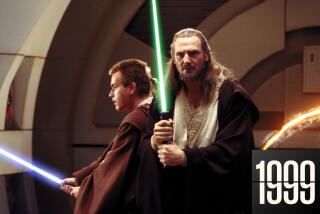Amid ‘Troopers’ Gore, It’s Easy to Miss the Message
- Share via
Kenneth Turan, like many critics, found it quite easy to dismiss Paul Verhoeven’s “Starship Troopers” for its bad acting, weak script, inane dialogue, unimaginative design and overabundant violence (“Stop Buggin’ Me!,” Calendar, Nov. 7). While the film is admittedly painful to sit through for precisely these reasons, nobody seems to have latched on to the wildly subversive reasoning behind it.
In short, what Verhoeven has created is nothing less than a total replica of a propaganda film that the futuristic government of Earth itself would create, if in fact its goal were to recruit young men and women to swell the ranks of the Starship Troopers if they actually were engaged in a distant war. And the oh-so-subtle warning Verhoeven slips us is that people can be swayed by even “dumb” movies into supporting war and violence.
This idea probably eludes 99.99% of American viewers because our own government hasn’t called upon mainstream movie-makers to create bellicose propaganda in support of aggressive foreign policy, as opposed to regimes like Nazi Germany, Imperial Japan and Soviet Russia that actually commissioned movies like “Starship Troopers” to justify their own expansionism.
When a government wants to make such a movie, who gets the job? The really talented filmmakers with high ethical and artistic standards? Of course not. That’s why nearly every German with even a hint of real talent fled Joseph Goebbels’ control of their film industry and came to Hollywood. So who makes war propaganda? Dull-witted, uncreative, soulless technoids . . . the kind of directors whose films are marked by bad acting, weak scripts, inane dialogue, unimaginative design and overabundant violence. This isn’t just a movie Hitler would have loved, it’s a movie he would have produced.
Many critics--although not The Times’ Turan--have noted the film’s predominant Nazi imagery (primarily the telltale costumes), but chalk it up either to the influence of Robert A. Heinlein’s novel, or by saying that Verhoeven really is a fascist, an argument that conveniently ignores that Verhoeven actually lived under Nazi occupation as a child; to believe a survivor of German conquest would genuinely promote a fascist future is absurd.
Thus while the aesthetics of “Starship Troopers” are derived from Nazi Germany, the mentality the movie truly explores and exposes through satire is that of warmongering, a condition certainly not limited to fascist dictatorships. The film can in fact be read as a textbook demonstration of how a typical Hollywood action flick can be subtly infected with ideas that can subvert the common morality.
The technique is simple: Find someone (or something) foreign (and ugly to our eyes) and declare them to be the Enemy. Create false situations to fuel our hatred of the Enemy until we’re justified in our desire to utterly eradicate them, by Any Means Necessary.
Another goal of war conditioning is to desensitize the recruits (and thus, here, the audience) to violence. This is a scary and very real technique, which Verhoeven gleefully pushes to the furthest extreme because he knows action fans come to this kind of movie anticipating blood ‘n’ guts anyway. But anyone who enjoys “Starship Troopers’ ” prolific splatter, Verhoeven may be saying, has unwittingly taken the first step to selling their soul.
The key to accepting this interpretation of the film is my belief that the bugs are innocent. The story’s own logic tells me that it was the Earth government that screwed up; their snazzy anti-meteor satellite failed, and Buenos Aires was destroyed. The government needed a scapegoat. They’ve been fighting skirmishes against the natives in faraway colonies, so they announce that the bugs “propelled” the meteor all the way across the galaxy to hit the Earth.
Even by sci-fi standards, even by Hollywood action movie standards, this is patently ridiculous. When we see the bug world, there’s nothing to even remotely suggest they have the technology to attack the Earth; they don’t even use tools.
Verhoeven knows this, and he knows the government’s explanation for the destruction of Buenos Aires is the Big Lie, a Big Lie that should ring hollow for us, especially for anyone who knows wars have often been initiated by atrocities of murky origins, such as the sinking of the battleship Maine, the rape of Nanking or the attack in the Gulf of Tonkin.
What Verhoeven seems to be saying is: “Always question authority.” Next time, youngsters of the world, you might not be asked to support total war against space bugs. The enemy might be African, Asian or Arab. Not as disgusting as a giant termite, perhaps, but you’d be surprised how a “good-natured” war flick can whip up your aggressions just the same.
Thus, as messages go, “Starship Troopers” is about as far from fascism as one could get. And if Verhoeven hasn’t made one of the best movies of the year, he’s certainly made one of the strangest and most audacious.
More to Read
Only good movies
Get the Indie Focus newsletter, Mark Olsen's weekly guide to the world of cinema.
You may occasionally receive promotional content from the Los Angeles Times.










